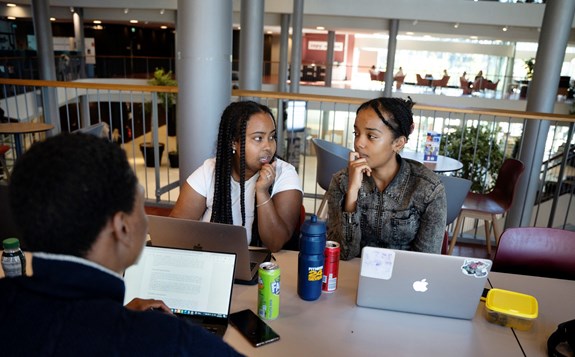We use cookies on this website. Cookies help us deliver the best experience on our website. Read about cookies.
-
- My Studies
- My Studies
-
- New student
- New student
- Malmö Smart Start Guide
- Schedules
-
- Book group rooms and find your way around Campus
- Book group rooms and find your way around Campus
- Codes of conduct
- Amphitrite
- Exams
-
- Rights and responsibilities
- Rights and responsibilities
- Your studies and AI
- Harassment and discrimination
- Scholarships for current students
On the page -
- Student Services
- Student Services
-
- Writing Centre and support
- Writing Centre and support
- Take-home exams and written assignments
- Maths workshop
- Student Health Services
- Study guidance
- Studying with a disability
- University Chaplaincy
On the page -
- Jobs and internships
- Jobs and internships
-
- Innovation and entrepreneurship
- Innovation and entrepreneurship
- Leapfrogs
- Internships
- Career guidance
- Vertically integrated projects (VIP) programme
On the page
Harassment and discrimination
and discrimination
What to do if you are victimised, your right to help and support, investigation, equality ombudsman (DO). Victimisation, discrimination, harassment and sexual harassment.
Anyone who applies or is admitted as a student at Malmö University should feel that they belong here - regardless of gender, ethnicity, gender identity or gender expression, social background, disability, sexual orientation, age, religion or other beliefs.
Harassment and discrimination at the University
Victimisation and harassment related to any grounds for discrimination or sexual harassment have no place at Malmö University. The University is obliged to act as soon as anyone becomes aware that someone is being victimised. This applies to students who victimise other students or staff, as well as students who feel victimised by a teacher or other staff members.
Examples of harassment, discrimination, and sexual harassment
Victimisation is defined as actions in the learning environment directed towards one or more individuals in an abusive manner that can lead to ill-health or exclusion from the workplace community. Examples include excluding or ostracizing someone during group work or using derogatory names.
Harassment is defined as conduct that violates someone’s dignity and is related to any of the seven grounds of discrimination: sex, transgender identity or expression, ethnicity, religion or other belief, disability, sexual orientation or age. For example, making sweeping judgments about individuals based on their (presumed) ethnic background.
Sexual harassment is defined as conduct of a sexual nature that violates someone’s dignity. Unwanted compliments or groping can be examples of sexual harassment.
What to do if you are victimised
Inform the person who is subjecting you to harassment, discrimination, or sexual harassment that you feel victimised and want the behaviour to stop. You can also ask someone you trust to talk to the person you feel victimised by.
The next step is to inform a member of staff in your department or another department at the University so that the University can investigate the incident. You can contact your teacher, programme manager, study counsellor, head of department or other staff member.
Also write down the time, place, what happened, and how you experienced it.
You have the right to get help and support
If you’ve experienced victimisation, discrimination, or any form of harassment (sexual or otherwise), or if you’ve witnessed others being subjected to any of these, you can get support and help from the coordinator for equal opportunities, Lena Örnberg.
If you have been victimised, you can also contact the Student Union. If you want to talk about what you have experienced, you can book an councelling session with the Student Health Services.
The University is obligated to investigate
All staff members have a duty to act as soon as they become aware that a student may have been subjected to victimisation or any form of harassment.
The investigation process
The University must conduct an investigation even when suspicions are based on rumours or anonymous oral or written statements. Usually, the person responsible for the programme or course (often the head of department) oversees the investigation.
The investigation typically begins with the investigator speaking to the student who feels victimised and the individual(s) who have been identified as involved in the incident. All parties involved are given an opportunity to share their version of events.
It can be difficult to investigate and take specific action if the victim wishes to remain anonymous. The investigation can then lead to generalised and preventive measures.
When the investigator has spoken with all relevant parties and collected other relevant information, an analysis is conducted. Subsequently, a report is written, which should also include information about any actions taken during the course of the investigation.
If the responsible manager determines that there has victimisation, harassment or sexual harassment has taken place, they must decide on appropriate measures. These measures can be implemented at both individual and group levels, as well as at an organisational level.
When the investigation concludes, both the person who considers themselves to have been victimised as well as the person who is alleged to have victimised the other person are informed. The University also follows up on the investigation to ensure that the learning environment is free from victimisation, discrimination, harassment and sexual harassment.
The University's responsibility according to DO
As an education provider, Malmö University is obliged to regularly investigate whether there are risks of discrimination. The risks must then be analysed and addressed and then followed up. Active measures against discrimination must be taken in five different areas: admission and recruitment, examinations and assessments, study environment, studies and parenting, teaching methods and organisation.



